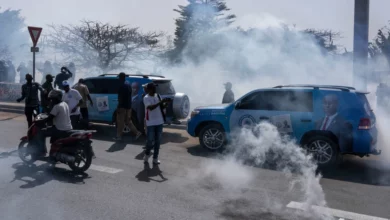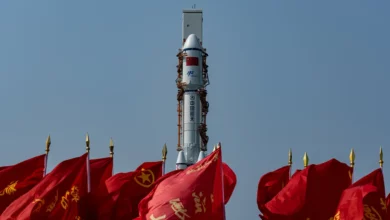When one of Egypt’s best-known pro-democracy movements split recently, many feared the event might signal a major blow for Egypt’s opposition during the current period of transition. Group members feared that the division could be a plot engineered to weaken the effectiveness of the revolutionary forces, but experts say that internal divisions within political movements during transitional periods are to be expected.
The April 6 Youth Movement, a three-year-old movement that has become one of the most prominent youth groups to take part in the revolution, recently split into two factions following dispute over its internal processes. The split, depending on who you ask, took place at some point between April and August.
April 6 has now become two factions: April 6 Youth Movement – Democratic Front, representing those who broke away from the old organization, and the April 6 Youth Movement – Ahmed Maher Front, which represents those who chose to stay with the original group.
The splinter group alleges that they are fighting to democratize the movement, which they say has been run by a small group of elites who fail consult the grassroots before making strategic decisions.
“Even before the revolution, there were deep divisions within the movement due to the refusal of the movement’s leaders to conduct internal elections,” said Tarek al-Kholi, the spokesperson of the April 6 Youth Movement – Democratic Front, the splinter group.
Some accuse Ahmed Maher, the 30-year-old general coordinator of the group, of making unilateral decisions, such as when he previously suggested transforming the movement into an NGO. Many believe that this move would entail accepting foreign funding – a highly controversial step.
Maher, however, denies intentions to turn the group into an NGO. “We’re thinking of a way to create a legal environment for political ‘pressure groups’ in the country after the revolution. We’re neither an NGO nor a political party. We are a pressure group and there is no legal status for us,” Maher told Al-Masry Al-Youm. Maher’s vision of a “pressure group” would act as a kind of watchdog over politics with grassroots support.
But such disagreements within the movement may not be cause for concern. Many other opposition groups have faced fractures since Mubarak’s ouster in February. Scores of coalitions have appeared, competing to represent the revolution. Similarly, leftist groups have failed to unify around one political party. A liberal front gathering all liberal forces was suggested by liberal politician Ayman Nour, but failed to materialize.
“That’s simply the nature of the transitional period. You have divisions within the political movements all the time and within the coalitions that appeared after the revolution,” said Hala Mustafa, Editor-in-Chief of Al-Ahram's political quarterly Democracy Review.
“Those divisions are either based on conflicting political strategies or how to organize internally, such as in the case of the April 6 Youth Movement,” Mustafa said.
Some of the founders of the April 6 were activists in the youth branch of the Kefaya, the Egyptian Movement for Change, which was established in late 2004 with the aim of stopping Hosni Mubarak from running for re-election. Four years later, some activists used Facebook to call for a nationwide strike to support workers in the Delta city of Mahalla El-Kubra on 6 April, 2008.
They later formed the April 6 Youth Movement, which staged sit-ins and protests against the former ruling regime. They also played an important role in calling for the massive protests in 25 and 28 January, that eventually lead to Mubarak’s removal. April 6 called on its members in cities throughout the Delta to prepare to take part extensively in the uprising.
“This kind of activism proves that we were in the street calling for democracy and members of the movement paid a high price for such activism. Being beaten by the police, detained or even accused of being a spy were regular threats,” said Maher.
“Those people who say that they are the real movement [the splinter group] weren’t at any time part of this activism. It’s true that some names are in the movement and were active during the revolution but they aren’t that many,” added Maher, suggesting that because he has been active with the group since 2008 he is the legitimate leader of the movement.
April 6 is described by analysts and media as liberal, but its members say that the movement gathers a wide range of activists representing moderates from across the political spectrum, from leftists to Islamists.
The movement has also been singled out recently for criticism from the ruling SCAF, which has publicly accused it of receiving foreign funding with the intention of "creating discord between the army and the people."
Last April, the New York Times alleged that American pro-democracy NGOs such as the Washington-based Freedom House trained members from the April 6 Youth Movement on how to use communication technology and social networks in posing political pressures.
The movement denied the report, saying that all its resources are membership fees and donations from Egyptians only.
When asked about those allegations, Maher said: “I have to repeat here that we don’t accept funds. We are depending on the membership fees and donations from Egyptian public figures. Out activism is purely voluntary.”
“Some people say that SCAF seeks to weaken all the main forces that took part in the revolution. I’m not fully convinced of that but you have to think about the fact that the movement was attacked by SCAF and at the same time a [splinter] group wants to hijack the whole movement,” said Maher.
Members of the Democratic Front have said that they call for internal democracy in order to achieve transparency and ease concerns about foreign funding.
According to Maher, his movement currently has members in 24 of Egypt’s 27 governorates, with an average 1000 to 1500 members in every governorate.
Kholi, of the splinter group, dismisses that estimate. “The April 6 Youth Movement has presence in only 12 governorates,” Kholi told Al-Masry Al-Youm. “The movement is not that big.”
The splinter group is even smaller. According to Kholi, members of the movement from around eight governorates joined the splinter front.
Regardless of its actual size, Maher says that the group is still influential, and has become one of the few youth movements that the government has consulted on political issues. “We’ve introduced our vision concerning some laws that SCAF and the government proposed,” said Maher.
Last week, the movement suggested amendments to some proposed laws, such as the anti-religious discrimination law, the law regulating local councils, and the treason law.
The fact that the main movement has influence with the government and military doesn’t bother the Democratic Front, which is now working to gather as many members as possible.
“Currently we have the support of at least eight provincial branches of the movement, especially in Alexandria. We called for internal elections within the movement in September and we invited the Ahmed Maher Front to take part in this election,” said Kholi, who added that Zakaria Abdel-Aziz, a leading figure in the judiciary independence movement, will supervise the elections.
Ahead of last Friday’s planned protests in Tahrir, dubbed “For the Love of Egypt,” the two groups disagreed over whether or not to participate. The Ahmed Maher Front insisted that the movement should take part in the event in order to return Tahrir Square to the protesters. The Democratic Front, however, alleged that political forces did not prepare well for the event.
But as an observer, Mustafa, the editor of Democracy Review, isn’t convinced that efforts by the Democratic Front are worth taking seriously.
“That could be only a show. All the factions that allegedly fought to internally democratize the political movements or the political parties ended up by diminishing the strength of the movement itself. You will achieve internal democracy if you have wide support that pushes for internal democracy,” said Mustafa.




